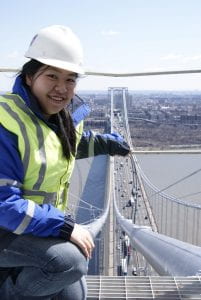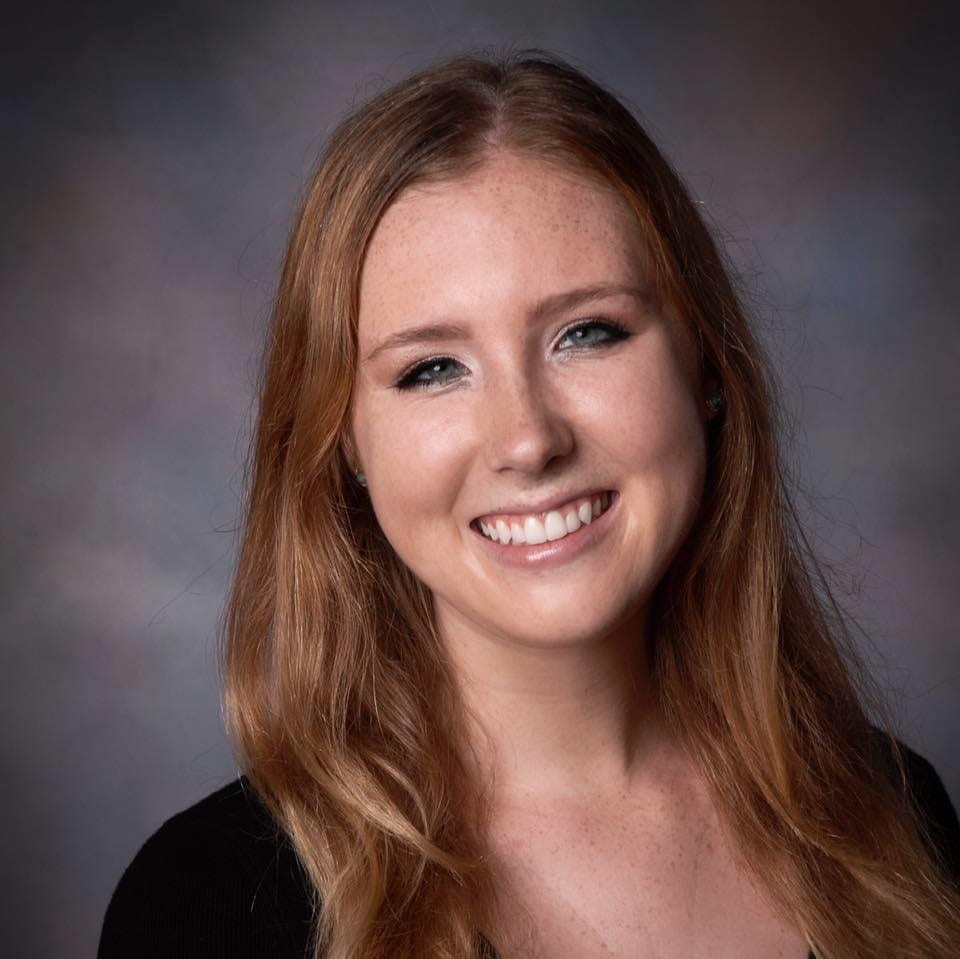Civil engineers are innovators, creators, and entrepreneurs. They design and build buildings, bridges, dams, and devise complex systems, such as transportation and water-supply networks, or information systems for design and management of engineering projects. They innovate new technologies for natural disaster detection and preparedness, and discover new methods for building technologies that are more sustainable and have greater longevity. Many civil engineering graduates go on to take leadership positions in established companies or start their own firms. You may also decide to continue on to participate in Cornell’s graduate-level Civil and Environmental M.Eng. program or the Cornell Engineering Management program.
Environmental engineers
The world needs people who have a sense of purpose and a first-class engineering education, who are prepared to tackle modern environmental problems and sustainability issues. Students wishing to pursue a master of engineering (M.Eng.) degree in environmental engineering can solve problems that are closely related to either civil engineering or biological engineering. Whether you study biofuels development, sustainable agriculture, soil and water systems, or applied molecular bioengineering, as an M.Eng. graduate, you will be highly sought after by employers in both the public and private sectors.
M.Eng. Early Admission for Cornell Undergrads
If you are a Cornell undergraduate who wants to pursue an M.Eng., the College of Engineering offer an early admission option that allows you to get a head start on your graduate work. You may apply during your last semester of undergraduate work if have no more than 8 credits remaining to complete your bachelor’s degree. Once you are accepted, you may begin work on your M.Eng. program at the same time you are completing the requirements for your undergraduate degrees.
M.Eng. in Civil and Environmental Engineering
Enhance your career with a Master’s of Engineering in Civil and Environmental Engineering. The M.Eng. degree at the School of Civil and Environmental Engineering provides a flexible curriculum, real-world practical experience and access to a network of Cornell alumni.
The Master of Engineering degree is a course work and project-oriented program. It is normally completed in two semesters of intensive study. Each program typically consists of course work in a major concentration and supporting areas as well as a project.
Master of Engineering students in Civil and Environmental Engineering may focus their studies in one of the following major subject areas:
- Structural Materials and Mechanics
- Environmental Processes
- Environmental Fluid Mechanics and Hydrology
- Environmental and Water Resource Systems Engineering
- Sustainable Energy Systems
- Transportation Systems Engineering
- Transportation, Environment, and Health
Master of Engineering (Engineering Management) Program
The M.Eng. program in engineering management is aimed at engineers who want to stay in a technical environment, but focus on managerial roles. Graduates of this program are in demand by civil engineering and construction firms, management consultants, industrial companies, and other organizations that focus on the efficient management of projects and technical systems. The Cornell Engineering Management Program offers two exciting opportunities to earn your M.Eng. degree: On Campus and Distance Learning.
Who employs our students?
Here are a few companies that have hired our students: ARUP, Clark Construction, Malcolm Pirnie, Parson and Brinckerhoff, Robert Silman Associates, SGH, Skanska, Stantec, Sterns & Wheeler, Thornton & Tomasetti, Turner Construction and Weidlinger, just to name a few.
Alumni Spotlight
Susie Lai
B.S. ’11, M.Eng. ’12 in transportation systems
Work Title: Staff Services Traffic Engineer for the Port Authority of New York and New Jersey
 Susie leads a traffic planning group within the Port Authority’s Traffic Engineering group. Her group performs a lot of traffic modeling and demand forecasting. The PA has planned major regional construction projects that will affect the region over the next few years at its tunnels, bridges, and airports. These facilities will need to still be operational when they are under construction and that is where Susie’s group of engineers come in to play. They will review the proposed construction and analyze the impact this construction will have in traffic delays and rerouting. They think about the customer and how to keep people moving while infrastructure is being built.
Susie leads a traffic planning group within the Port Authority’s Traffic Engineering group. Her group performs a lot of traffic modeling and demand forecasting. The PA has planned major regional construction projects that will affect the region over the next few years at its tunnels, bridges, and airports. These facilities will need to still be operational when they are under construction and that is where Susie’s group of engineers come in to play. They will review the proposed construction and analyze the impact this construction will have in traffic delays and rerouting. They think about the customer and how to keep people moving while infrastructure is being built.
CEE Educational Take Away:
Susie enjoys her work. She feels her education prepared her well for the career position she holds. At Cornell she learned “how to fail” and knew that if she did not know how to properly do something, she learned. From that knowledge, if a mistake is made she knows how to recover from it. She knows that there are no challenges she cannot eventually overcome thanks to the skills Cornell and CEE have instilled in her.
CEE Alumni talk about their time at Cornell at the 2019 CEE Open house.

Meredith Urschel
Alumni Spotlight
Meredith Urschel, Civil Engineering 2019
I started at Cornell in the Engineering college, but I was unsure about my specific path. Early on in freshman year, I applied to a Civil Engineering bridge building project team and, through its collaborative hands-on student design and machining process, I quickly realized that I loved to create and build structures. I also learned formulae and software that I wouldn’t utilize until later on in my studies. This project team, along with a very interesting introductory course I was taking called Modern Structures, helped inform my choice to become a Civil Engineering major. I became very involved within the “CivE” community, specifically within the American Society of Civil Engineers, or ASCE. I was the Social Chair one year, then the President the next. My junior year, I took a leap of faith and decided to take Concrete Design, which is the most intense design course offered within Civil Engineering. Long story short, I fell in love with concrete. Professor Ken Hover was so inspirational and passionate about concrete that it was honestly difficult not to develop a liking of the material. I ended up taking Advanced Concrete Design that next semester, then TA’d both courses the following year and took a Concrete Materials class senior spring.
I had a few internships that helped to confirm that I wanted to work in the Civil Engineering sphere. My freshman summer, I worked for a commercial construction company in San Francisco. We built a large biotech campus, but I worked mostly on the campus’ concrete parking garage. My sophomore summer, I worked for a residential construction company that builds homes in Atherton and Menlo Park. My junior summer, I switched it up and interned for a structural design firm in NYC. Because of this broad set of experiences, I wasn’t entirely sure what I wanted to do after graduation. I was still ASCE’s president when we planned the Clark Construction Company career event during their fall Career Fair weekend. That event led to interviews with Clark, and I was eventually hired! I found out shortly after graduation that I had been placed in Clark’s self-perform concrete division, Clark Concrete. Now, I’m on the team managing the concrete construction of the new Air Force One Hangar on Joint Base Andrews, and I absolutely love what I do. I’ve learned so much in the past year. Being an integral part of such an amazing, historical, lasting project has been really special, especially because I’ve seen our site transition from dirt to a semi-finished product!
My title is Engineer, which is the entry-level position. However, being at a subsidiary, I’ve been able to touch on (at different levels) almost all of the aspects of what Clark Concrete does in a little over a year. My bosses believe in me and consequently have been giving me a lot of responsibility, which pushes me to do my best. I’m learning more and more every day by speaking with our field employees and subcontractors, too. It’s been very valuable to see another side of construction (direct field work and working solely with concrete) as I worked for a general contractor as an intern.
Interviewers used to ask me why I chose to be a Civil Engineer. The short answer is this––I think I’ve always had an idea, even if I didn’t know what that line of work was called. I’ve always liked to design and build things. Now I have the chance to see a finished product and say “hey… I did that!” I even used to tell my dad that I would build an entire community underwater to fix our environmental problems. While that may have been a tad ambitious, this attitude has very much influenced my budding career.
